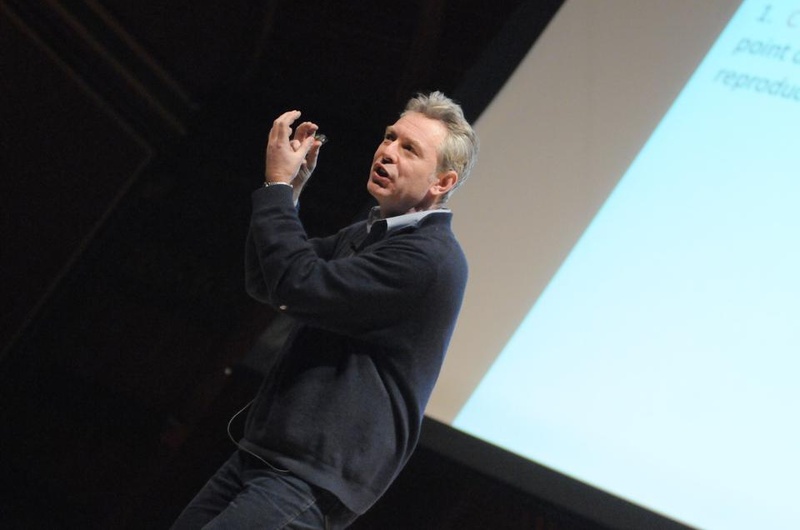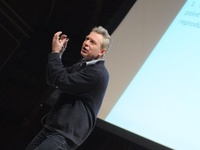The 10 professors stood on stage in Sanders Theatre, like rock stars—students in the audience cheering and whistling as they were introduced. Many had faced long waits in the line that had begun snaking its way from Memorial Hall to the front of the Science Center almost two hours beforehand. Hundreds more had been turned away when the spacious hall reached capacity.
In the first annual “Harvard Thinks Big” event, spearheaded by two students with the help of three major student groups, 10 professors from various fields were brought together to speak for 10 minutes each about their areas of expertise.
Lectures discussed issues ranging from the human psyche’s evolutionary inability to process the threat of global warming, to the significance of cooking for human evolution, to the necessity for religious pluralism.
Harvard Kennedy School Lecturer Timothy P. McCarthy, who hinted that his days at Harvard might be numbered during his 10-minute presentation, discussed the future of protest—an area in which “teabaggers and terrorists and other terrible people might have gotten a head start.”
At a juncture of his speech that drew moans from the audience, the protest literature lecturer also had choice words about Harvard’s embattled former president Lawrence H. Summers.
Multimedia
“We need to stop worrying about the state of our endowment and start worrying more about why our former president who’s responsible for the endowment’s state is now advising the president on how to fix the financial crisis,” McCarthy said.
McCarthy ended his discussion with a petition for immediate action, to “bring about a new birth of protest.”
“We came to Harvard for the professors,” said Derek M. Flanzraich ’10, who conceived and planned the event along with Peter D. Davis ’12. “We come to talk about ideas. Everyone [tonight] can talk about what they’re passionate about.”
Flanzraich, who said the idea for the event was inspired by the series of popular lectures known as “TED Talks,” added that yesterday’s lectures, once published online, might reach the biggest audiences some of the professors had ever accessed.
Passion was a universal theme, and one that Computer Science Lecturer David J. Malan ’99 stressed in his personal story of how he changed from a Government enthusiast to a Computer Science concentrator after realizing he looked forward to the Friday nights spent coding for problem sets in his Mather House dormitory room.
Malan used the event as a platform to introduce a new Web site that will allow students to suggest ideas—particularly inefficiencies around campus—for next fall’s batch of CS50 students to address.
“If we get 1,000 students to submit ideas, then, think about it: that’s 1,000 improvements in a year,” Malan said.
Psychology Professor Daniel T. Gilbert introduced the idea of why global warming has not galvanized a stronger reaction.
Humans measure threats by intentionality, immorality, imminence, and instantaneousness, he said, explaining that global warming—a slow-moving, amoral, unintentional event—possesses none of these traits.
Other speakers at the event included Assistant Professor in English Matthew B. Kaiser, who talked about rhetoric that labeled “boyish” characteristics as overly immature.
Read more in News
Chicken and Duck Owners in Cambridge Lose Appeal














